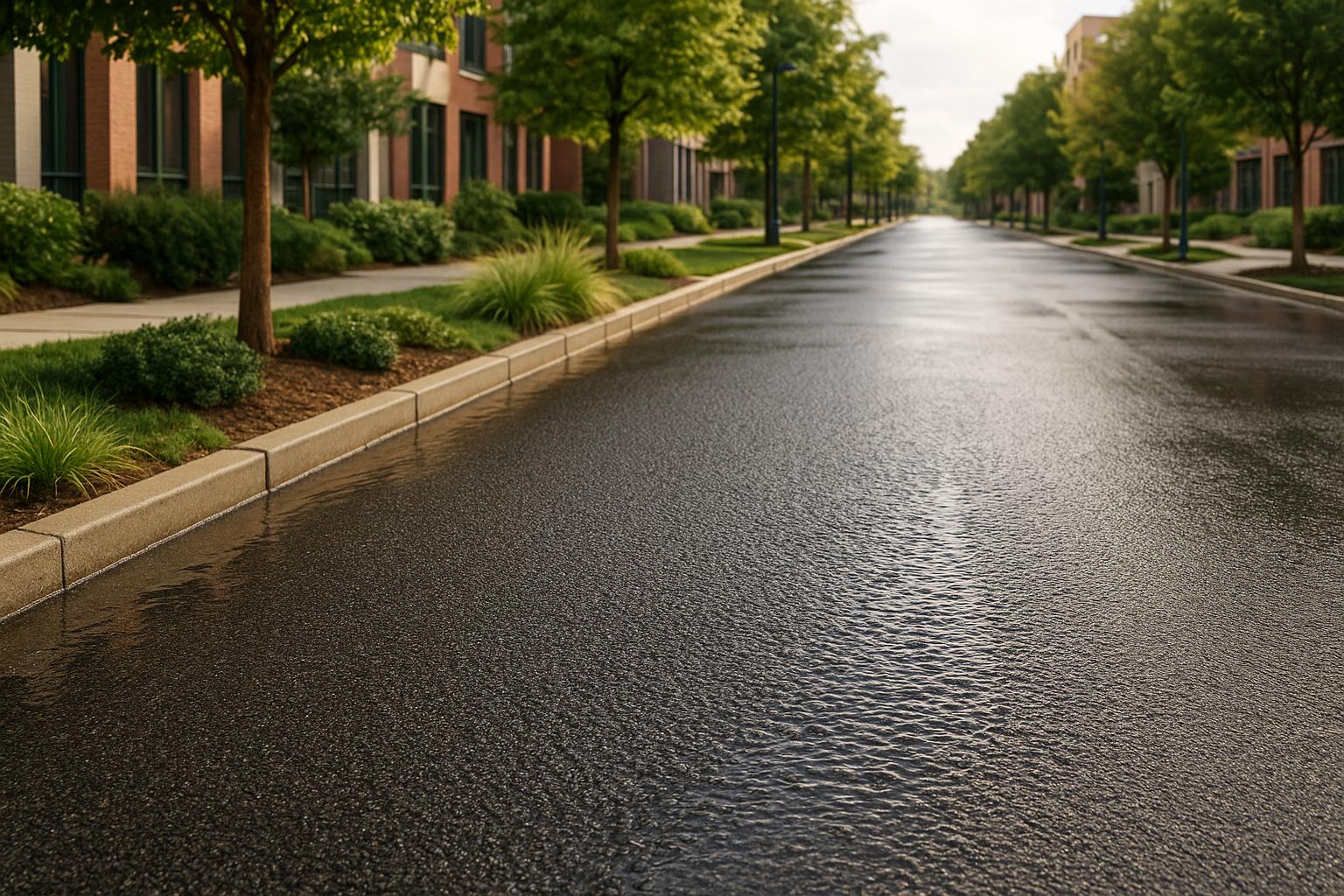- bhavya gada
- No Comments
Porous asphalt is a game-changer for managing water runoff. Unlike conventional asphalt, it lets water seep through its surface, reducing runoff, preventing floods, and improving water quality. Here’s what you need to know:
- Reduces Surface Runoff: Water passes through the asphalt into the ground, cutting runoff by 45–99%.
- Prevents Flooding: Eliminates pooling and ponding, improving safety and drainage.
- Recharges Groundwater: Allows water to infiltrate the soil, replenishing aquifers.
- Improves Water Quality: Filters contaminants like oil and heavy metals naturally.
- Lowers Heat Retention: Stays cooler than regular asphalt, reducing urban heat buildup.
Porous asphalt is a smart solution for areas with heavy rainfall, offering better drainage and safer surfaces while supporting natural water cycles.
The Benefits of Porous Asphalt @infraday @wsdot
1. Better Stormwater Absorption and Less Surface Runoff
Porous asphalt stands out due to its distinct structural design. Unlike traditional asphalt, which acts like a waterproof shield, porous asphalt is built with interconnected pores that let stormwater pass directly through the pavement surface [3]. This simple yet effective design changes how water behaves on your property.
With traditional asphalt, rainwater has no choice but to flow sideways, creating surface runoff. Porous asphalt, on the other hand, allows water to move downward through the pavement into specially designed stone layers beneath. These layers are engineered to gradually filter water into the soil [3].
Beneath the surface, there’s an aggregate layer with 35–40% void space and a thickness of 18–24 inches [4]. This gives the system a high capacity to store water, making it capable of handling heavy rainfall without overwhelming drainage systems.
Research shows that porous pavements can cut runoff by 45–99% and retain up to 70% of rainfall [5][6]. This significant reduction in runoff means less water flowing into already overburdened municipal storm systems. Instead of contributing to urban flooding, porous asphalt helps manage stormwater by replicating natural soil filtration processes [1].
For Maryland property owners dealing with frequent heavy rains and drainage issues, this approach allows water to be absorbed where it falls. Rather than rushing water away, porous asphalt manages it on-site, reducing runoff and improving resilience. Pro Landscapes MD specializes in stormwater management and paver installation, offering effective solutions for central Maryland communities. This method not only manages water effectively but also sets the stage for additional advantages discussed later.
2. Flood Prevention and Better Site Safety
Heavy rains in Maryland often lead to pooling on traditional pavement, creating hazards and overloading drainage systems. Porous asphalt offers a game-changing solution by allowing water to pass through the pavement quickly, cutting down surface water buildup and significantly lowering the risk of flooding.
What makes porous asphalt stand out is its ability to direct water into underlying stone layers almost instantly. This prevents the common issues of pooling or ponding found on conventional surfaces. It’s especially beneficial for high-traffic areas like driveways, walkways, and parking lots, where standing water can cause property damage and pose serious safety risks [8].
A real-world example highlights its effectiveness. In Ann Arbor, Michigan, porous pavement with underdrains was installed, completely eliminating ponding and significantly reducing winter icing issues [4].
This material also enhances road safety by minimizing aquaplaning and reducing spray effects, which improves both traction and driver visibility [8]. On top of that, it helps combat winter hazards by preventing ice formation and speeding up the de-icing process. This reduces the need for excessive salt, which can harm nearby landscaping and contaminate groundwater [4].
Pro Landscapes MD applies these drainage benefits to protect properties across central Maryland. By helping property owners adopt porous asphalt solutions, they ensure both safety and property protection in areas prone to heavy rainfall.
3. Groundwater Recharge and Aquifer Replenishment
Porous asphalt plays a key role in restoring natural water cycles by allowing water to seep through and replenish local aquifers. This process not only aids in water storage but also ensures a gradual release, mimicking how water naturally infiltrates the ground.
The design of porous asphalt includes layers that enhance infiltration. Water collects in an underlying stone reservoir and is slowly released to replenish aquifers, closely replicating natural processes. This helps maintain healthy aquifer levels, which are vital for drinking water supplies and sustaining the baseflow in rivers and streams [7][9][11].
Compared to conventional asphalt, porous pavements significantly improve water infiltration. They can absorb and infiltrate up to 80% of rainfall, whereas traditional asphalt directs nearly all water into runoff [13]. Urbanization, with its impervious surfaces, disrupts the soil’s natural ability to retain water, but porous asphalt helps restore this balance, even in heavily developed areas [12].
Another advantage of porous systems is their ability to filter out pollutants. As water percolates through the layers, contaminants such as sediments, heavy metals, and hydrocarbons are removed. This natural filtration is further enhanced by soil microorganisms and adsorption processes [9][10][11].
For optimal groundwater recharge, the underlying soil must be permeable enough to allow full infiltration. In cases where soil conditions are less favorable – like the deep clay layers encountered in the Ann Arbor Sylvan Avenue project – porous pavement systems can be engineered to redirect water effectively [4].
In Maryland, where groundwater recharge is especially important, Pro Landscapes MD offers expertise in stormwater management. Their team can assess site conditions to determine if porous asphalt systems are a good fit for maximizing groundwater recharge benefits.
sbb-itb-843f8be
4. Better Water Quality Through Natural Filtration
Porous asphalt works like a natural water filter. It directs stormwater through layers of permeable materials that capture particles and contaminants, including suspended solids and lead [5].
Research from the UK, led by Pratt, revealed that porous pavement systems consistently kept suspended solids and lead levels low over a six-month period. This highlights how effective these systems are compared to traditional, non-porous surfaces [5]. Such findings point to the potential for improved drainage solutions in areas like Maryland.
In Maryland, Pro Landscapes MD incorporates these advanced drainage systems to boost on-site water absorption and improve water quality in urban settings.
5. Lower Urban Heat Island Effect and Environmental Compatibility
Porous asphalt stays cooler than traditional asphalt thanks to its unique design. The material’s porous structure allows for better air circulation and evaporative cooling, helping to reduce the heat buildup commonly seen in urban areas. This cooling effect not only makes outdoor spaces more comfortable but also adds to the ecological advantages of using porous asphalt.
Unlike traditional asphalt, which absorbs and retains heat, porous asphalt helps regulate temperatures while also managing stormwater effectively. Its ability to handle runoff and improve water quality makes it a practical choice for communities in Maryland that are embracing sustainable development to meet environmental guidelines.
Porous asphalt also supports broader sustainability goals. It meets local stormwater management requirements and contributes to LEED certification by encouraging natural water infiltration. Instead of forcing rainwater into storm drains, it allows precipitation to seep into the ground, improving water quality and replenishing groundwater supplies.
Pro Landscapes MD integrates porous asphalt into their drainage systems across central Maryland. Their installations not only manage water runoff efficiently but also help keep outdoor areas cooler, creating eco-friendly hardscaping solutions.
Additionally, porous asphalt helps maintain soil moisture, which supports plant life and biodiversity. By providing better conditions for vegetation and preserving the balance of local ecosystems, it addresses some of the disruptions caused by traditional impermeable surfaces. This thoughtful approach benefits both the environment and the surrounding community.
Comparison Table
The table below provides a side-by-side look at how porous asphalt and conventional asphalt handle water management.
| Factor | Porous Asphalt | Conventional Asphalt |
|---|---|---|
| Water Runoff Reduction | Allows stormwater to pass through interconnected pores into a stone bed and soil, greatly reducing surface runoff and easing the burden on storm sewers [14][1][2]. | Creates an impervious surface, forcing water into runoff and straining drainage systems. |
This table underscores how porous asphalt can effectively reduce water runoff compared to its conventional counterpart.
Conclusion
Porous asphalt brings a lot to the table when it comes to managing water runoff. It absorbs stormwater efficiently, cutting down on surface runoff and helping to prevent floods, which makes sites safer. It also recharges groundwater, helping to replenish local aquifers, while naturally filtering water to improve its quality. On top of that, it helps reduce urban heat island effects, making it a smart choice for more eco-friendly spaces.
What makes this solution even better is how it works seamlessly with nature, managing stormwater right where it lands.
Local expertise can make a big difference in maximizing these benefits. Pro Landscapes MD specializes in drainage solutions and stormwater management throughout central Maryland. Their services include installing drainage systems, creating effective stormwater management setups, and using eco-friendly pavers to design outdoor spaces that are both functional and environmentally conscious. From Annapolis to Gaithersburg and across Howard and Montgomery counties, they provide solutions that tackle water issues while keeping landscapes intact.
Whether you’re dealing with standing water, erosion, or just looking for a sustainable way to manage drainage, porous asphalt is a smart, forward-thinking choice. It turns stormwater problems into manageable solutions, all while contributing to long-term water conservation efforts.
FAQs
How does porous asphalt help reduce urban heat compared to regular asphalt?
Porous asphalt offers a smart solution for managing urban heat. Unlike traditional asphalt, it reflects less sunlight and is better at dissipating heat, helping to keep temperatures lower. Its unique design allows water to pass through, encouraging evaporation that naturally cools the surrounding area. This dual effect helps combat the urban heat island phenomenon by reducing both daytime and nighttime heat levels.
Another advantage of porous asphalt is its ability to handle stormwater effectively. By allowing water to drain through instead of pooling on the surface, it prevents heat buildup from stagnant water. Incorporating this material into cityscapes can help create cooler, more comfortable urban environments while addressing sustainability challenges.
What are the environmental advantages of using porous asphalt for stormwater management?
Porous asphalt offers some impressive benefits when it comes to managing stormwater. Its structure is designed to let water seep through the surface, which helps trap pollutants like suspended solids. This process not only keeps harmful contaminants out of nearby water bodies but also helps improve water quality overall.
Another advantage is how it encourages natural water infiltration. By allowing water to soak into the ground, porous asphalt helps replenish groundwater levels and significantly cuts down on surface runoff. This reduction in runoff lowers the chances of flooding and erosion. Plus, it aligns with nature’s way of managing water, making it a smart and environmentally friendly option for stormwater management.
How does porous asphalt improve water quality and support groundwater recharge?
Porous asphalt offers a practical way to enhance water quality and replenish groundwater. Its design allows stormwater to flow through the surface and into the ground beneath, where natural filtration processes help filter out pollutants. This reduces the volume of water that would otherwise rush into storm drains, carrying contaminants with it.
By channeling water back into the soil, porous asphalt also aids in aquifer recharge, helping to maintain stable groundwater levels. This approach not only supports water management but also lowers the risk of flooding. It’s a smart, eco-conscious method for managing stormwater while promoting healthier ecosystems.


















Chat with Us